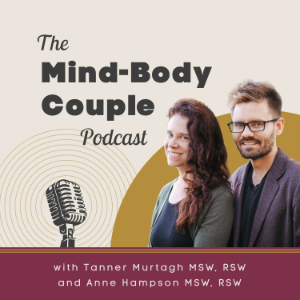
The Mind-Body Couple
Health & Wellness Podcasts
Tanner Murtagh and Anne Hampson are therapists who treat neuroplastic pain and mind-body symptoms. They are also married! In his 20s, Tanner overcame chronic pain and a fibromyalgia diagnosis by learning his symptoms were occurring due to learned brain pathways and nervous system dysregulation. Post-healing, Tanner and Anne have dedicated their lives to developing effective treatment and education for neuroplastic pain and symptoms. Listen and learn how to assess your own chronic pain and symptoms, gain tools to retrain the brain and nervous system, and make gradual changes in your life and health!
The Mind-Body Couple podcast is owned by Pain Psychotherapy Canada Inc. This podcast is produced by Alex Klassen, who is one of the wonderful therapists at our agency in Calgary, Alberta. https://www.painpsychotherapy.ca/
Tanner, Anne, and Alex also run the MBody Community, which is an in-depth online course that provides step-by-step guidance for assessing, treating, and resolving mind-body pain and symptoms. https://www.mbodycommunity.com
Also check out Tanner's YouTube channel for more free education and practices: https://www.youtube.com/channel/UC-Fl6WaFHnh4ponuexaMbFQ
And follow us for daily education posts on Instagram: @painpsychotherapy
Disclaimer: The information provided on this podcast is for general informational and educational purposes and is not a substitute for professional advice, psychotherapy, or counselling. If you choose to utilize any of the education, strategies, or techniques in this podcast you are doing so at your own risk.
Location:
United States
Genres:
Health & Wellness Podcasts
Description:
Tanner Murtagh and Anne Hampson are therapists who treat neuroplastic pain and mind-body symptoms. They are also married! In his 20s, Tanner overcame chronic pain and a fibromyalgia diagnosis by learning his symptoms were occurring due to learned brain pathways and nervous system dysregulation. Post-healing, Tanner and Anne have dedicated their lives to developing effective treatment and education for neuroplastic pain and symptoms. Listen and learn how to assess your own chronic pain and symptoms, gain tools to retrain the brain and nervous system, and make gradual changes in your life and health! The Mind-Body Couple podcast is owned by Pain Psychotherapy Canada Inc. This podcast is produced by Alex Klassen, who is one of the wonderful therapists at our agency in Calgary, Alberta. https://www.painpsychotherapy.ca/ Tanner, Anne, and Alex also run the MBody Community, which is an in-depth online course that provides step-by-step guidance for assessing, treating, and resolving mind-body pain and symptoms. https://www.mbodycommunity.com Also check out Tanner's YouTube channel for more free education and practices: https://www.youtube.com/channel/UC-Fl6WaFHnh4ponuexaMbFQ And follow us for daily education posts on Instagram: @painpsychotherapy Disclaimer: The information provided on this podcast is for general informational and educational purposes and is not a substitute for professional advice, psychotherapy, or counselling. If you choose to utilize any of the education, strategies, or techniques in this podcast you are doing so at your own risk.
Language:
English
Can Repressing Emotions Cause Chronic Pain and Illness?
Duración:00:36:10
Healing Chronic Pain Is Possible — Here’s How I Did It
Duración:00:49:23
8 Tips & Tricks for Brain Retraining — Rewiring the Brain Out of Chronic Pain & Illness
Duración:00:28:02
Healing Trauma Caused by Chronic Pain and Illness
Duración:00:32:26
Part 2: How to Go from Bed Bound to Fully Moving
Duración:00:31:11
Part 1: How to Go from Bed Bound to Fully Moving
Duración:00:30:00
The Morning Routine That Can Rewire Your Brain & Heal Chronic Pain
Duración:00:44:46
3 Habits that Keep You in Chronic Pain and Symptoms
Duración:00:26:38
Take Manual Control of Your Nervous System
Duración:00:22:00
Somatic Therapy Explained: Feel Away Your Symptoms
Duración:00:20:49
Go From T to S: The Brain Retraining Method That Helps Desensitize Chronic Pain & Illness
Duración:00:27:16
How to Overcome Negative Thinking about Your Chronic Pain or Illness (Meditation Included)
Duración:00:43:44
5 QUICK Ways to Regulate a Sensitized Nervous System
Duración:00:31:58
Let Them: The Chronic Pain & Illness Edition
Duración:00:19:23
Breaking the Depression - Chronic Pain Cycle
Duración:00:26:02
Better Mindset, Better Results! A Path to Healing Chronic Pain & Illness
Duración:00:27:30
The Fight Response: Are You Fighting Against Your Chronic Pain or Illness?
Duración:00:25:10
The Purge: Releasing Emotions Heals Chronic Pain and Illness
Duración:00:30:24
Leveraging Your Strengths for Pain Recovery with Gemma McFall
Duración:00:30:46
How to Talk with Your Hurt Part (Meditation Included)
Duración:00:24:19